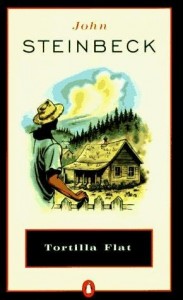Danny
Source Text: Steinbeck, John. Tortilla Flat. 1935. New York: Penguin Books, 1963. Print.
Entry Author: James Tyler
In The Grapes of Wrath, Mexicans only warrant vague mention as a massive throng of scabs threatening the prospects of Californian farmers and Midwestern migrant workers (Owens, 60). John Steinbeck’s The Pearl, a novella based on a Medieval Mexican folktale, presents its two main characters, Kino and Juana, more as symbolic victims of circumstance than as introspective human beings exhibiting any control over their situation. Despite the fact that a majority of John Steinbeck’s novels are set in California, one familiar with his work could very well argue that Steinbeck’s literature offers few complex Mexican-American characters. A refutation to this argument would inevitably have to include a discussion of Tortilla Flat (1935). In this variation on the Legend of King Arthur and his Knights of the Round Table, Tortilla Flat’s hero, Danny, outwardly emerges as the level-headed voice of reason and authority figure; in effect, the “King Arthur” figure of the “Paisanos.” A “Paisano” is defined by Steinbeck as “a mixture of Spanish, Indian, Mexican, and assorted Caucasian bloods. His ancestors have lived in California for a hundred or two [hundred] years. He speaks English with a Paisano accent and Spanish with a Paisano accent” (Steinbeck 2). Like the other “Paisanos” of Tortilla Flat in Monterey, California, Danny is of Mexican-Anglo-Indian descent, described as “related to nearly everyone in the flat by blood or romance” (Steinbeck 3). Danny’s willingness to open his doors to the other “Paisanos,” when he inherits two houses from his grandfather, establishes him as the unofficial leader of this racially mixed group.
As such, Danny emerges as the focal point of the story and the calm center around which the comparatively more colorful Pilon, Pablo, and Big Joe, revolve. Unlike the stereotypical authority figure, however, Danny is unhappy with this arrangement. He hails from wealth, but is entirely unenthused with the finery of “influential relatives,” choosing to live as a “vagrant wresting his food and wine from an unwilling world” (Steinbeck 3). Burdened with the responsibility of managing not one, but two houses, Danny is obligated to abandon these vagabond ways in favor of focusing on property management and fiscal responsibility. He seethes with frustration for a month, before disappearing from the house and embarking on a crime spree, or a “quest,” if you will, leaving the town of Tortilla Flat in almost complete disarray. Upon the realization that this act has not changed his situation, he grows disillusioned and descends into alcoholism. Danny’s friends’ best attempts to help him fail, and most spectacularly with a party in his honor. Danny descends into madness and throws himself to his doom after erupting into hysterical fits of violent anger, likely induced by heavy drinking.
The source of Danny’s rage is ambiguous and Steinbeck dances around the legitimate cause of Danny’s almost quixotic disillusionment with life, choosing to assign its origins to a populist yearning for independence from legitimate responsibility. But, could Danny really have exhibited a difficulty adjusting to civilian life and finding his identity following his WWI service? According to historian Gregory Rodriguez, WWI “accelerated assimilation” for the Mexican community, and “some soldiers returned home having experienced prejudice at the hands of Anglo officers” (Rodriguez 154). If Danny’s anger is motivated by a latent insecurity over his racial identity, it is unclear. Nonetheless, Steinbeck establishes Danny’s racial identity enigma almost from the start, when he describes the Protagonist’s behavior when asked about his race. “Whenever [Danny is] questioned concerning his race, he indignantly claims pure Spanish blood and rolls up his sleeve to show that the soft inside of his arm is nearly white” (Steinbeck 2). Described as “dark and intent” with a skin color like “a well-browned meerschaum pipe,” Danny attributes his complexion to sunburns, vehemently denying any mixed ancestry (Steinbeck 3). Interestingly enough, Danny is not above his own racial antipathy towards the very Caucasians he tries to claim kinship with. Upon learning of his new inheritance, he chooses to target Italian fishermen by assailing them with ethnic slurs. “Race antipathy overcame Danny’s good sense. He menaced the fishermen. ‘Sicilian bastards,’ he called them, and ‘Scum from the prison-island,’ and ‘Dogs of dogs of dogs.’ He cried, ‘Chinga tu madre, Piojo.’ He thumbed his nose and made obscene gestures below his waist” (Steinbeck 6). Although the Italians hardly take his mockery seriously in the least, with an identity crisis of this magnitude, it is no wonder that Danny eventually was goaded into virtually losing contact with reality. Although Steinbeck does not attribute it to Danny’s descent into madness, neither does he absolve his inner conflict over racial identity from complicity in Danny’s Arthurian fall from grace.

